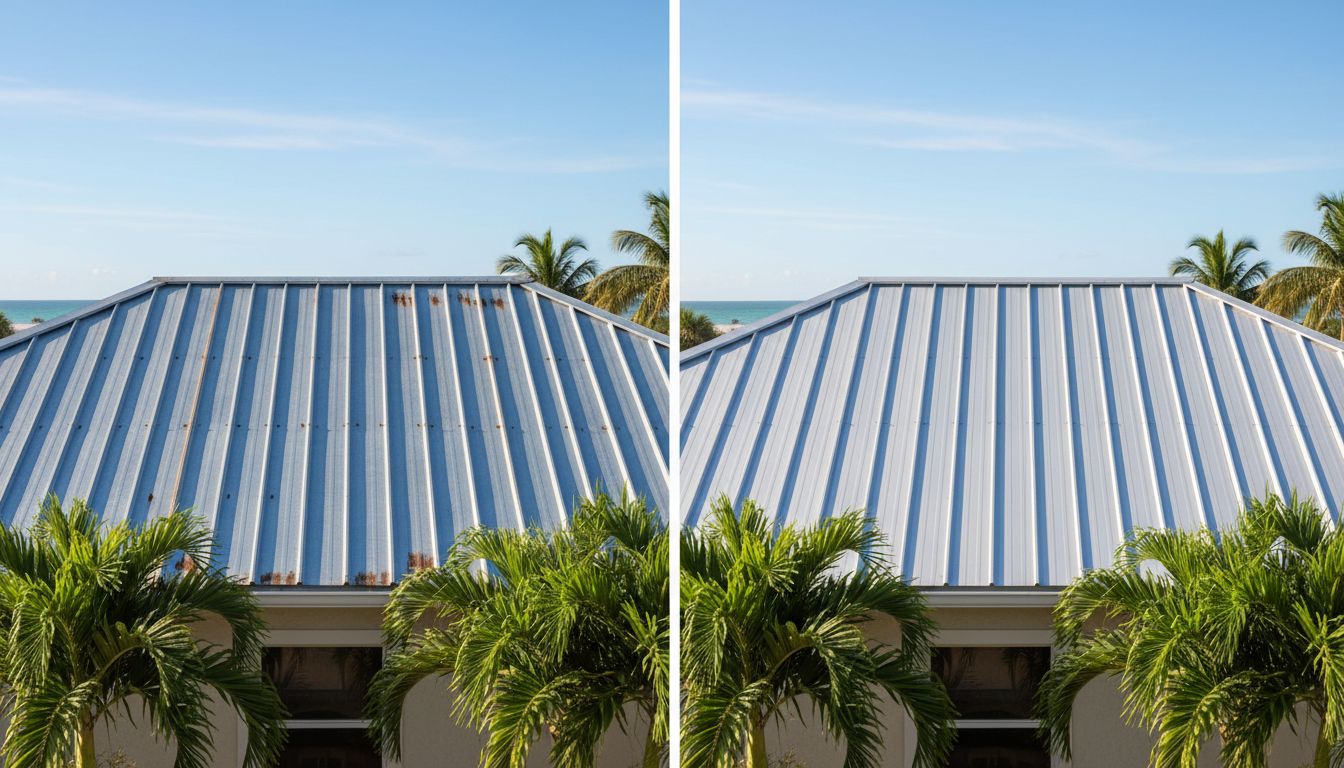Do I Need a Permit for a Roof Replacement in Cape Coral, FL?
Do I Need a Permit for a Roof Replacement in Cape Coral, FL?
Understanding Roofing Permit Requirements in Cape Coral
If you're planning a roof replacement in Cape Coral, FL , it's important to know that almost all such projects require a permit. Local governments enforce these rules to ensure safety and compliance with building standards. The Florida Building Code is the primary guideline used in Cape Coral, and permits help verify that your project meets these regulations. This protects not only your property but also the community as a whole.
These rules are enforced by local authorities like the Cape Coral Building Department, which reviews applications and conducts inspections. By obtaining a permit, you’re ensuring that your roof replacement aligns with codes designed to withstand Florida’s challenging weather conditions. Understanding this process is the first step toward a successful and compliant roofing project.
Types of Roofing Projects That Require Permits
Not every roofing task requires a permit, but major projects like complete roof replacements, changing roofing materials , or repairs involving structural components do. These types of work can significantly affect the integrity of your home, so they must be inspected and approved. For instance, replacing your entire roof or switching from shingles to tiles will almost always need a permit.
On the other hand, minor repairs like fixing a few loose shingles or cleaning gutters typically don’t require permits. However, it’s essential to confirm this with local authorities, as exceptions can vary. Knowing what type of work needs a permit ensures you stay on the right side of regulations while avoiding unnecessary delays or fines.
Why You Need a Permit for Roof Replacement
Obtaining a permit for roof replacement isn’t just about following rules—it’s about protecting your investment and ensuring safety. Permits guarantee that your roof complies with building codes, which are especially important in Florida due to frequent storms and hurricanes. A properly permitted roof is more likely to withstand strong winds and heavy rain, reducing the risk of damage.
Skipping the permit process can lead to serious consequences, including fines, insurance claim denials, or even having to redo the work. It’s always better to take the time to secure a permit, knowing that your roof will meet high standards and provide long-lasting protection for your home.
Roof Replacement Permit Application Process in Cape Coral
The process of applying for a roofing permit in Cape Coral starts with submitting an application to the Building Department. Homeowners or their licensed contractors must provide detailed information about the project, including plans, specifications, and cost estimates. Contractors typically handle this step, but owner-builders can also apply if they meet specific requirements.
For owner-builders, additional documentation may be necessary to prove competency and responsibility for the project. Whether you hire a contractor or take on the role of an owner-builder, understanding the application process is key to ensuring your project moves forward without unnecessary delays.
Required Documentation for Permit Applications
To apply for a roof replacement permit, you’ll need several documents, including detailed drawings, material specifications, and cost estimates. If your project involves structural changes or tile roofs , engineering approval might also be required. These documents help the city assess whether your project complies with local codes and standards.
It’s crucial to double-check your paperwork before submission to avoid delays. Missing or incomplete documents can slow down the approval process, leaving you unable to start your project on time. Taking the time to prepare thorough documentation ensures a smoother experience overall.
Common Inspection and Approval Procedures
Once your permit is approved, inspections become a critical part of the roof replacement process. Inspectors from the city will visit your property at various stages to ensure the work meets safety and code requirements. These checks focus on materials, installation methods, and structural integrity.
Inspections protect homeowners by verifying that the roof is built to last and comply with local regulations. Scheduling inspections promptly and addressing any issues raised by inspectors helps keep your project on track. This process ultimately ensures that your new roof is safe and durable.
Permits for Minor Roof Repairs and Exceptions
While most roof replacements require permits, minor repairs often fall into an exception category. Fixing a few damaged shingles , cleaning gutters, or performing emergency repairs after a storm typically doesn’t need formal approval. These tasks are considered low-risk and unlikely to impact the overall structure of your home.
However, it’s always wise to check with local authorities to confirm whether your specific repair qualifies as exempt. Regulations can change, and what seems minor to you might still require a permit under current rules. Staying informed ensures you remain compliant while completing necessary repairs.
Owner-Builder vs. Contractor Responsibilities
When it comes to roof replacements, there are distinct differences between owner-builders and licensed contractors regarding permit responsibilities. Licensed contractors usually handle the entire permitting process, including submitting applications and scheduling inspections. They also assume liability for the work performed.
Owner-builders, on the other hand, take on legal responsibility for the project themselves. While this option allows homeowners to manage their own projects, it comes with additional paperwork and oversight requirements. Understanding these roles helps you decide the best approach for your roof replacement.
Permit Fees and Other Costs
Applying for a roof replacement permit involves fees, which vary depending on the scope of the project. Additional costs may arise from engineering consultations or multiple inspections. To find the most accurate fee schedule, contact the Cape Coral Building Department directly or check their website for updated information.
Permit Application Tips for Cape Coral Residents
To streamline the permit application process, gather all required documents ahead of time and use Cape Coral’s online permitting system if available. Double-check your paperwork for accuracy and completeness before submitting. If you encounter questions or uncertainties, don’t hesitate to reach out to the Building Department for guidance —they’re there to help.
What Happens If You Replace Your Roof Without a Permit?
Replacing your roof without a permit can lead to significant consequences, including fines, orders to remove and redo the work, and potential denial of insurance claims. Additionally, failing to secure a permit could cause complications when selling your property, as buyers and lenders may require proof of compliance.
Avoid these costly setbacks by ensuring your project follows all local regulations. Taking shortcuts might seem convenient, but the risks far outweigh any perceived benefits. Always prioritize obtaining the necessary permits to safeguard your investment and peace of mind.
Additional Considerations for Hurricane and Storm Resistance
Florida’s roofing codes are specifically designed to enhance hurricane and storm resistance. The permitting process ensures that your roof meets these stringent standards, providing added protection against severe weather events common in Cape Coral. From wind-resistant materials to proper installation techniques, compliance with these codes is vital for long-term durability.
By adhering to these regulations, you’re not only protecting your home but also contributing to the resilience of your community. Ensuring your roof can withstand Florida’s unique climate challenges is one of the smartest decisions you can make as a homeowner.
Frequently Asked Questions
Is a permit always required for roof replacement in Cape Coral?
Yes, a permit is required for any full roof replacement or significant repair , but some minor fixes may not need one. Always verify with local authorities to confirm your specific situation.
Can I do a roof replacement myself as an owner-builder?
Yes, owner-builders can apply for permits with proper documentation, but they assume legal responsibilities and may need to submit extra forms. Be prepared for additional oversight and requirements.
How long does it take to get a roof replacement permit?
Most permits are processed within a few days to weeks, depending on the completeness of documentation and the complexity of the project. Plan accordingly to avoid delays.
Are inspection requirements strict for roof replacements?
Inspections are thorough, focusing on safety, materials, and code compliance, with multiple checks during and after construction. Expect rigorous evaluations to ensure quality workmanship.
What if my roof was damaged in a hurricane—do I still need a permit?
Yes, permits are required even after storms; emergency repairs may be temporarily exempt, but permanent replacement work will need approval. Check with local authorities for guidance.
Conclusion
Securing a permit for roof replacement in Cape Coral is a critical step that ensures legal compliance, personal safety, and property protection. Following the city’s permitting process guarantees that your roof meets high standards, offering greater durability and resistance to Florida’s harsh weather conditions. Both homeowners and contractors benefit from adhering to these regulations, which ultimately result in a stronger, longer-lasting roof.
Before starting your roof project, always confirm your permitting needs with Cape Coral's Building Department to avoid costly setbacks and ensure your new roof will stand strong for years. Organize your documents, familiarize yourself with the process, and seek assistance when needed to make your project smooth and successful.




